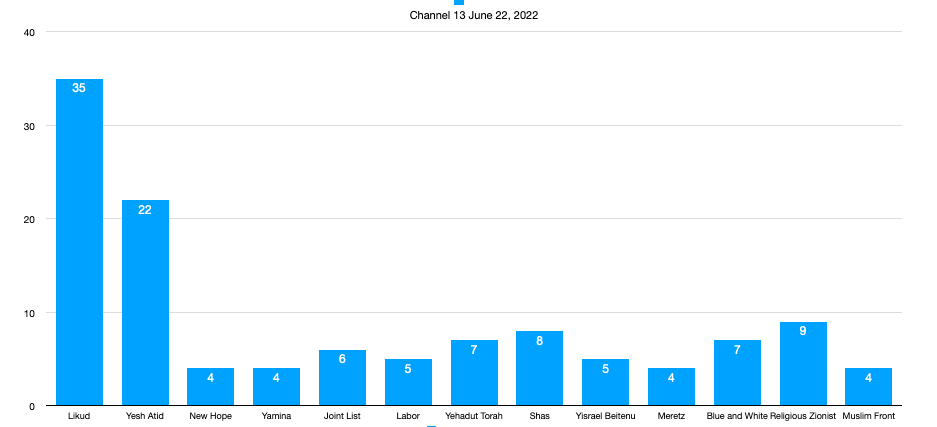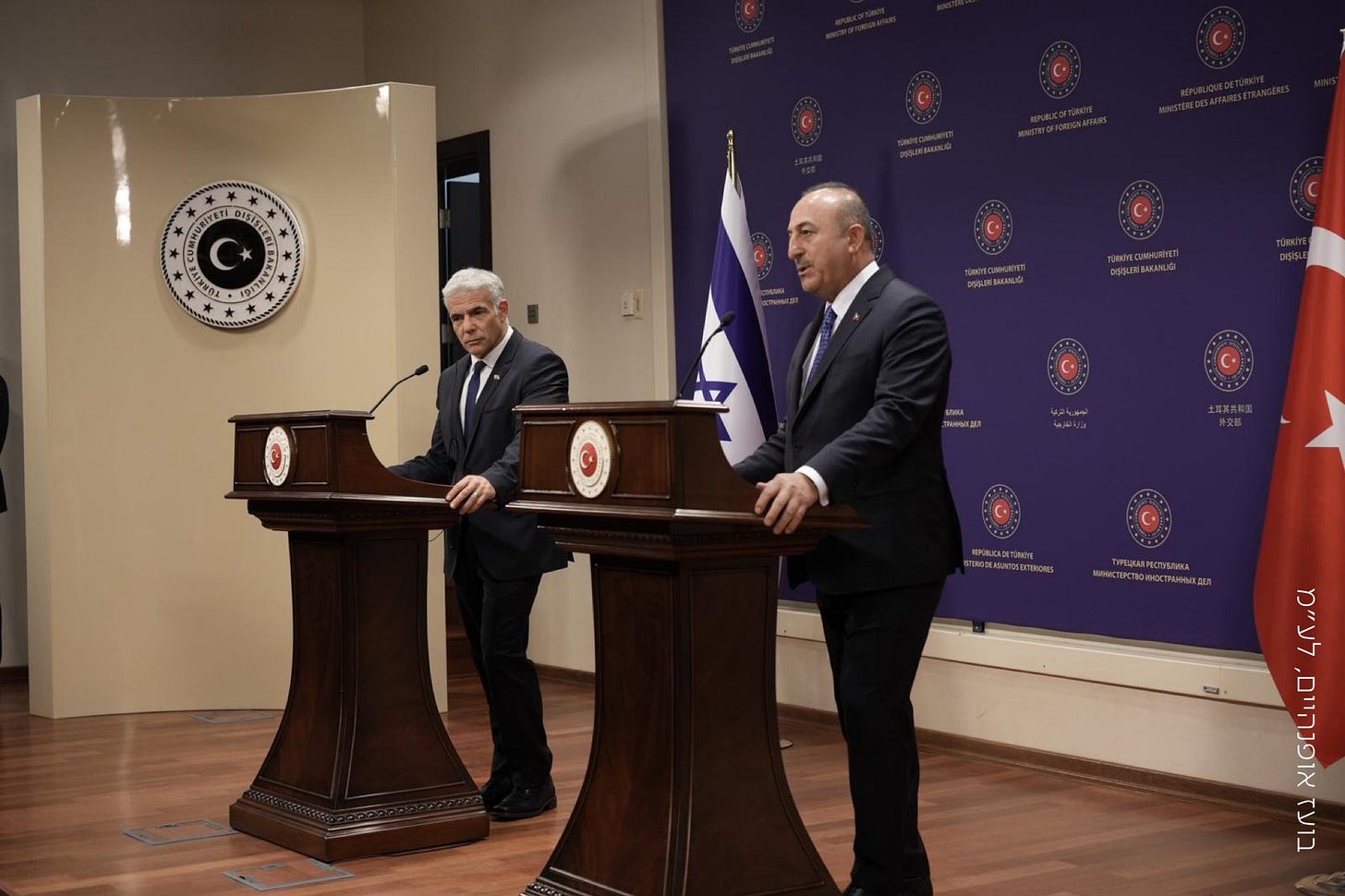Israel Update Week Ending June 24
Government Falls,Lapid to Turkey,Election Poll,Tents in Tel Aviv and more
POLITICS
Well, it happened. On Monday, in a dramatic and surprising move, Prime Minister Bennett and Alternative Prime Minister Lapid announced they plan to call for the disbandment of the Knesset, and the end of the government. However, unlike Netanyahu, Bennett did not employ any tricks. Instead, based on their agreement, Bennett will indeed turn over the reins of government in an organized fashion to Yair Lapid, who will serve as interim Prime Minister until a new government is formed after the election. In case multiple elections are required to form a coalition, Lapid will remain the Prime Minister until the new coalition congeals. A close friend who has been here since 1975 said to me this morning, Bennett is the first Prime Minister who I have thought better of when he left office then when he started.
The reason the latest coalition failed is threefold: 1) Two Arab members who refused to vote with the coalition; 2) The religious members of Bennett’s Yemina party, who could not withstand attacks and accusations claiming they were “sitting in a government with terrorists” (referring to the Arab Ra’am party), and 3) Benjamin Netanyahu who seems to believe that only he can save Israel and be Prime Minister. As a result of his refusal to retire, despite being on trial for bribery and general corruption, Netanyahu has single-handedly caused 3 years of political instability in the country.
Now that the first vote has been taken to disband the Knesset, the final vote is expected next week. Both Arab lawmakers partially responsible for the government collapse have announced they will not run again for Knesset. If the pair had resigned one week ago, it is possible the government would have been able to continue, at least for a few more months. But, of course, the real culprit for the government’s downfall is Idit Silman of Yemina, the coalition whip, who decided to leave the coalition two months ago, for no really good reason, other than continued pressure she received from people in her community (and her husband).
Where do we stand now? The Knesset will probably vote on its own dissolution on Tuesday or Wednesday. Before they disperse, the government is trying to pass several laws considered non-controversial— including a law that would allow work on the Tel Aviv Metro to begin, and of course, an extension of emergency regulations on the West Bank. There is talk of finally passing the law that would stop someone under indictment from becoming Prime Minister. However, that law is unlikely to pass.
Elections will be held on November 1. In his newsletter, the Deep Shtetl, Yair Rosenberg provides a good profile of Yair Lapid, who, unless there is a stunning development will be Israel’s Prime Minister, probably starting next Wednesday
I have interviewed Lapid and came away impressed. I think support for Lapid will grow over the course of the time he serves as Prime Minister. Lapid has much more charisma than Bennett and knows how to work with the media. Will those assets make a difference in the election? It will likely increase the number of votes Yesh Atid receives, in all probability at the expense of both Labor and Blue and White party. However, this shift will also likely have no impact on the balance of support within each of the political blocs. The most significant factor that could affect the upcoming election’s outcome a major change in voter participation in the Arab Israeli sector.
Here are the starting polls …
To be honest, I prefer not to write about another election or appear on TV about another Israeli political race with all the same players and stories, but that die has already been cast.
One last thought about Israeli politics… We now have the most unstable democracy in the world, as we head toward on election #5.
DEFENSE AND FOREIGN AFFAIRS
Foreign Minister, and soon-to-be Prime Minister Lapid, made a quick visit to Turkey today. There, he met with Turkish Foreign Minister Mevlut Cavusoglu and the head of Turkish Intelligence. While Lapid was on the way to Ankara, the Turkish media broke the story that an Iranian attempt to assassinate Israelis last weekend was thwarted by the capture of a significant number of suspects; some Iranian citizens were arrested.
According to Turkish sources, the Turkish security services and the Mossad worked closely to stop the attack. This close cooperation convinced Lapid that the time was right to respond to Turkey’s outreach by heading there for a visit. At the joint press conference, the Turkish Foreign Minister clarified Turkey would not stand for any terror activity aimed at Israelis on its soil.
In a related development, Hussein Tayeb, head of the IRGC Intelligence Organization, was replaced by the IRGC commander-in-chief General Hussein Salami. It is speculated that this was a result of the combined failures to stop the mysterious deaths of Iranian scientists, and other defense officials, as well as the inability of Iran to mount any retaliation.
SOCIAL PROTEST
Eleven years later, tents have returned to Rothschild Blvd. in Tel Aviv, as demonstrators protest the high cost of housing. After more than a decade, not only have prices never gone down, they have nearly doubled over the course of this time. However, unfortunately, none of the governments over these eleven years have taken effective action. Moreover, none of the parties running in recent elections have presented any plans to deal with the problem.
BUSINESS AND ECONOMY
Emirates Airlines commenced flights to Tel Aviv on Thursday. In addition, they have begun an advertising campaign aimed at prospective Israeli passengers.
Several Israeli high-tech companies have laid off workers in the past few weeks. The decision to dismiss employees is not a result of a worsening economic situation, but rather the realization that future plans to raise additional funds will have to be put on hold. As a result, companies will have to learn how to live within their means, and no longer continue to grow, regardless of the cost.
It should be noted, regarding Israel’s economy, that any downturn in the new high-tech sector will more than be made up for by how well Israel’s Defense Industries are expected to perform in the next few years, largely due to the war in Ukraine.
Some companies have continued to raise money:
Finout raised $14 million, in a round led by Team8 Capital. The company raised $4.5 million just one year ago in a seed round.
Base raised $14 million for its sales management platform.








